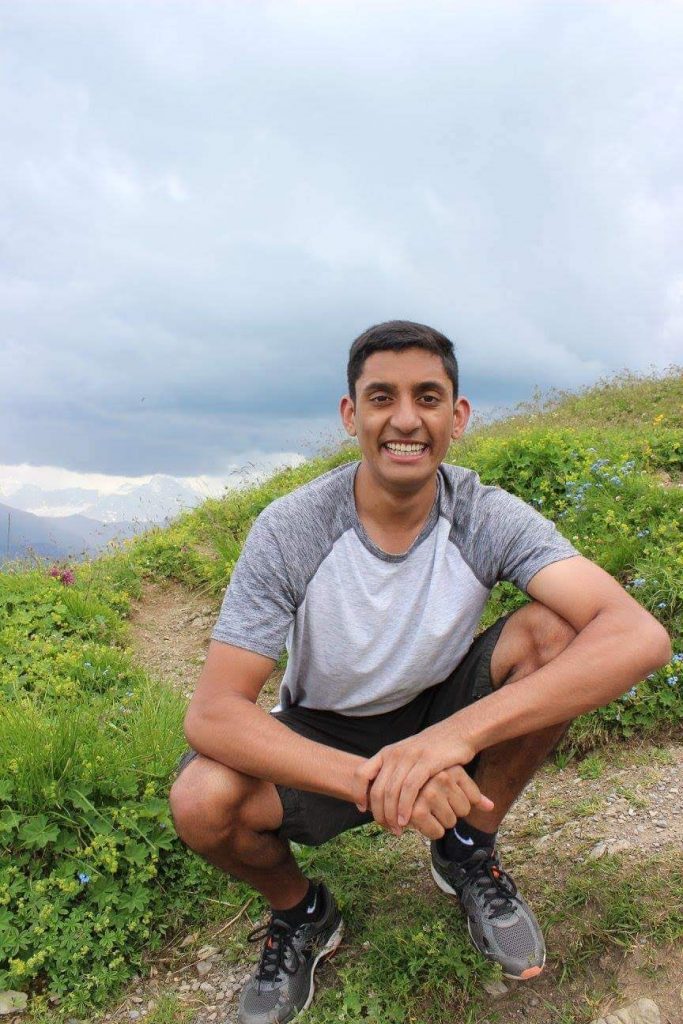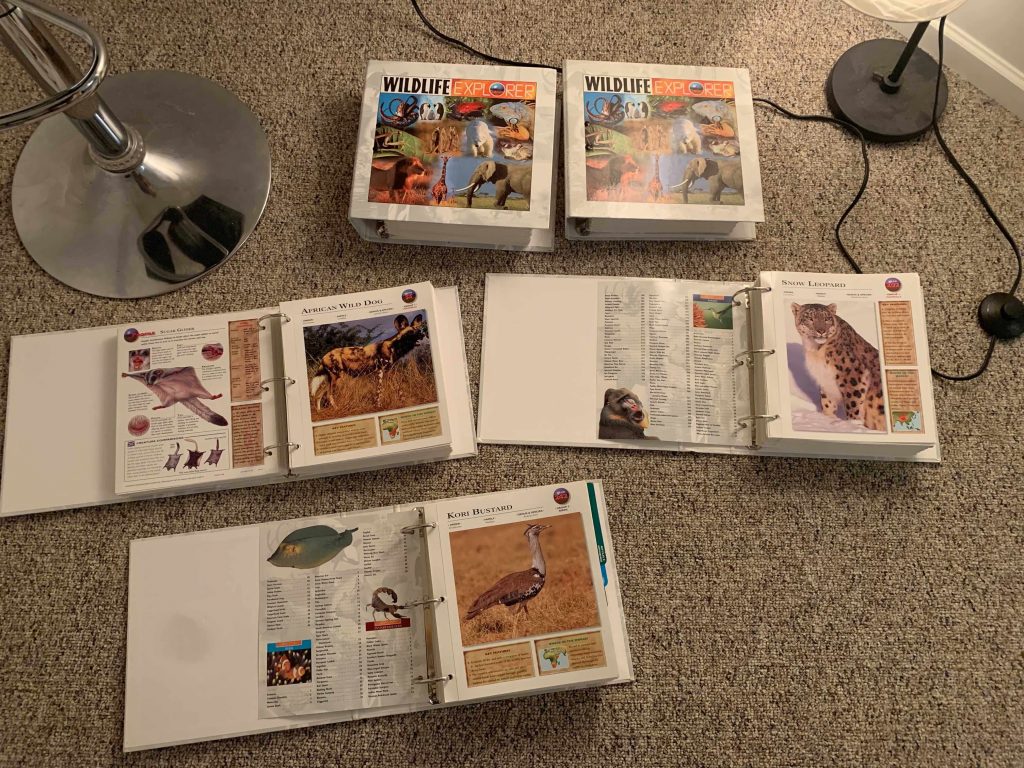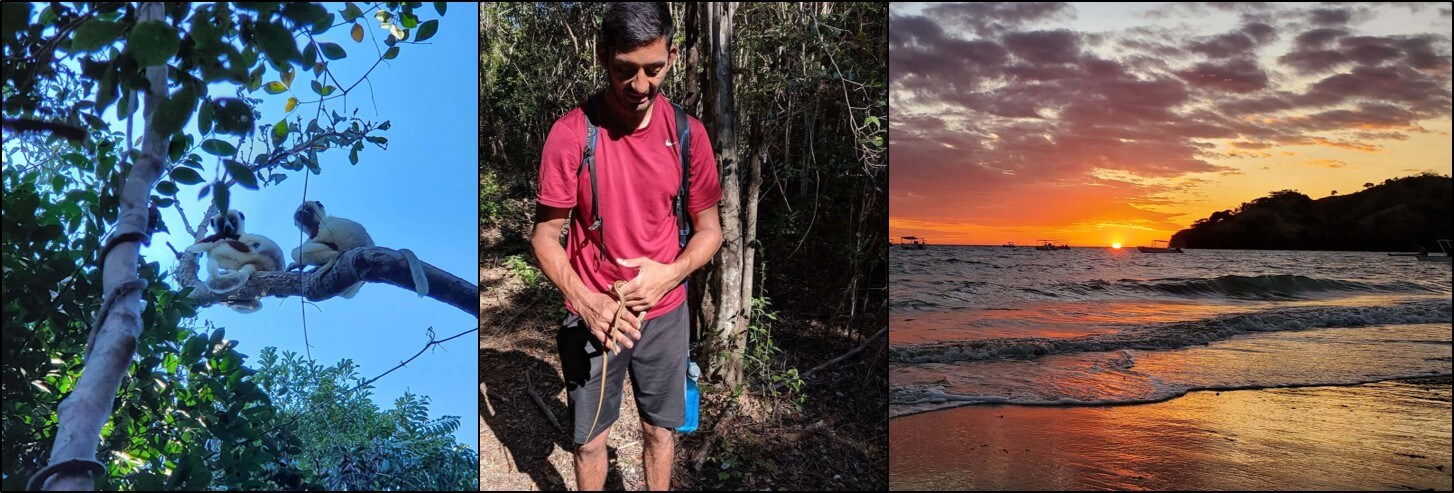
My name is Gaurav and I’m originally from Princeton, New Jersey. I got my BSc undergraduate degree in Biology at UBC and I am currently a 2nd year Master’s student in the Department of Zoology. I’m working in the Claire Kremen lab, which is also known as the Working to Restore Connectivity and Sustainability (WoRCS) Lab.
In my research I am investigating if and how sustainable agricultural systems can facilitate mammal movements and connectivity in European landscapes. Ultimately, I’m trying to better understand how we can change our agricultural methods and practices so that they’re both sustainable for biodiversity and for production as humans. This work is very interdisciplinary and is meant to inform potential changes for how we can sustainably farm in the future. It’s really important work and I’m excited to be part of it.
I am currently a lead-TA for BIOL 112 (Introduction to Cell Biology) and have also been a TA in this course during the previous two terms.
What do you most enjoy about being a TA?
I really enjoy conversing with students and helping them with different types of topics that they have questions about, from the course material, to future careers, to how they can get into biology or whatever path they want to pursue at UBC. It’s very fulfilling to act as a role model for them, and I have subsequently built really good relationships with students because of that.
The approach that I have always taken as a TA is that I’m here to facilitate learning, not to just give students all the answers, so it’s really enjoyable when I’m working with a student to help them understand something and then I see them get it – I can see their eyes light up once they reach that “aha” moment and I can see it in the way that they are able to not only talk about the information better, but ask well thought and deep follow-up questions. It’s this reaction that I get from my students that drives my passion to keep teaching and to find new ways to improve my teaching.
What has being a TA brought to your graduate studies experience?
Being a TA has made me more confident in presenting my work and has helped to shape the way that I talk about my research with others. It has also helped me become more personable in a sense, because I’m interacting with students and instructors all the time.
What has been an interesting outcome of your TA experience?
An interesting outcome has been the relationships that I have developed with students. As an undergrad I never got too close to a TA because I would only ever ask them questions about the course material – I didn’t ask them about how they got into their career and what shaped their career choice. The most surprising part about being a TA is that students will ask me about how they can find their career path. I try to help them figure out what they want to study, and in turn I have gotten a lot of great compliments from my students and it has further validated my passion for teaching. Interacting with students and helping them is very fulfilling for me.
What got you interested in studying biology?
I wasn’t much of an outdoors kid when I was growing up, but I did watch a lot of nature documentaries and that is what really shaped why I wanted to go into researching animals and ecology. Most of my mornings were spent either watching Animal Planet, Zoboomafoo, or Steve Irwin! I loved animals as a kid so much so that I begged my mom to get me a subscription service where I would regularly receive cards about animals; kind of like baseball cards, but for animals as well as a myriad of other topics. Each card featured a specific animal and contained amazing visuals and facts, such as their habitat, distribution, morphology, behaviour, and conservation issues. I kept all the cards and I now have six large volumes that I’ve collected and keep in large binders that I eventually hope to share with others as a source of inspiration.

How has your unique background influenced your TA experience?
I had the extraordinary opportunity to visit Madagascar as a research assistant two years ago, and being in such a biodiverse area has shaped the way I think about teaching. I always try to teach through examples, and now as a TA in BIOL 112, I try to bring examples from my ecological background to the cellular biology realm. That’s really hard to do sometimes, but it’s helped me think about how I can teach in different and unique ways, rather than just using the textbook or the material on the slides. I try to relate concepts together and I think that’s where my background really helps.

I also took BIOL 112 as an undergrad, so I understand what the students are going through and I can draw upon my own experience as a student when I’m trying help them study and learn the material. It took me awhile to figure out how to study at university and I didn’t really figure it out until my third year, so now I always tell my students when they’re struggling that they will figure it out and learn how to study as they progress through university – it may be tough at this very moment, but things will get better.
What teaching-related opportunities have you been a part of?
I recently had the opportunity to teach a BIOL 112 lecture. I was of course very nervous, and at the beginning of class I told my students that this was my first time teaching a big lecture. It thankfully went smoothly with no logistical issues; I ran on time, and I was able to answer the students’ questions. Afterward I got an email from a student who said thank you and that I did a great job. This was by far the most unique and great experience I’ve had happened to me as TA.
What is something that you are currently doing in the UBC teaching and learning space that you are excited about?
I’m part of the UBC Learning Ecology and Evolution FUNdamentals (LEEF) program, which is an outreach volunteer program where graduate students get the opportunity to teach some aspect of their research to a class of students, from elementary all the way up to high school students. Next month I’m going to teach a grade 4/5 class about the environmental influences on animal population connectivity through an interactive “Floor-is-Lava” game. The reason that I’m doing this is to get more experience and practice with effectively communicating my research to non-experts so that they can understand these concepts without having to read a very technical report. I want to get better at conveying very complicated topics in simpler terms so that people can understand and start caring about our growing environmental issues.
I am also volunteering in the Nature Club program through the Beaty Biodiversity museum. In this program, kids come to the museum one day a month and learn about different topics related to biodiversity. I’m leading the event next month, which is focused on mammals, and I’m planning to bring in the mammal volume of my animal card collection to introduce kids to the vast array of species they have yet to discover. These cards were very influential in inspiring me to work with animals and I’m hoping that they will also inspire these kids in a similar way.
What do you like to do in your spare time?
I grew up playing hockey, so I love playing hockey and participating any sport, really, such as playing basketball and/or tennis with my friends. I love hiking and try to do field work whenever I can. I also enjoy cooking and reading, especially sci-fi fantasy, but also non-fiction books. In fact, right now I’m reading a book on the philosophy of animal cognition and behaviour.
What is a fun fact about you that people may not know?
I am a third-degree black belt in Taekwondo. I did Taekwondo for 13 or 14 years and I actively competed across the U.S. for about 5 years before winning a state champ in forms and sparring in 2009.
What are your plans following graduation?
First, I hope to take a break because I feel like I will need a break from studying for a while. Ultimately, I want to work for a non-governmental organization (NGO) to try and link animal behavior and conservation together to better understand ways that we can pursue conservation issues in the future. Eventually down the road I would like to also pursue a PhD in that aspect. I am not entirely sure what topic that would be yet, but it would likely be something to do with linking animal behavior/cognition and conservation to inform the way that we not only shape our conservation policies for the future, but how we understand our own cognitive processes with the relationships we build with wildlife and the natural world.